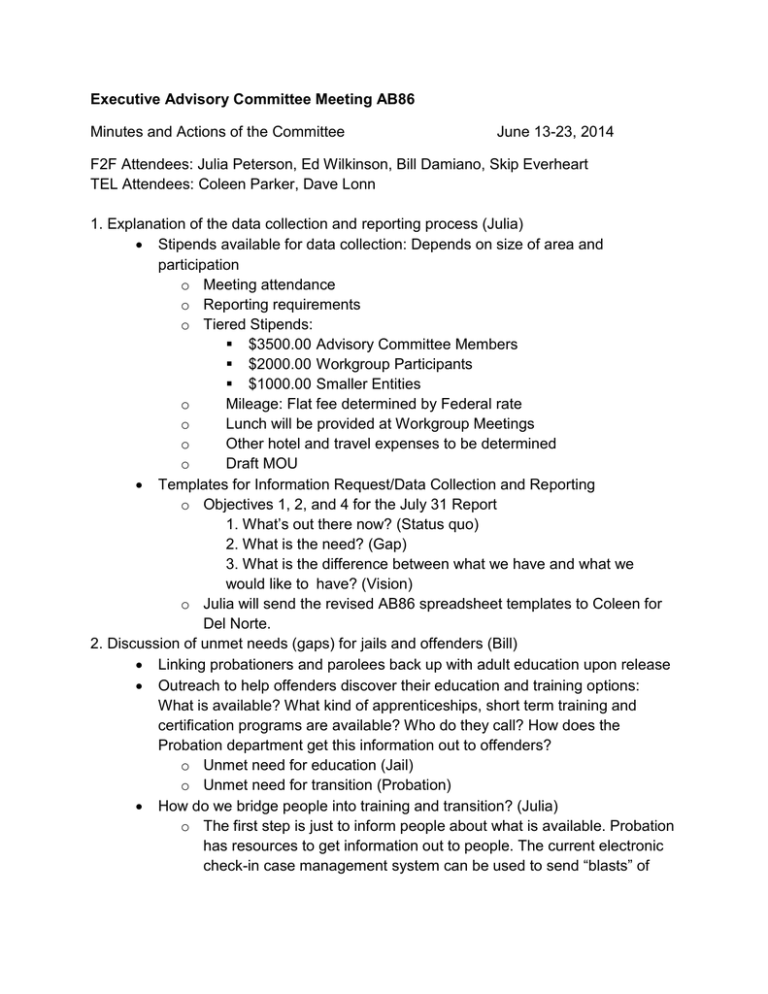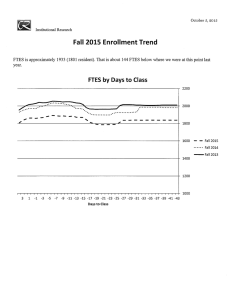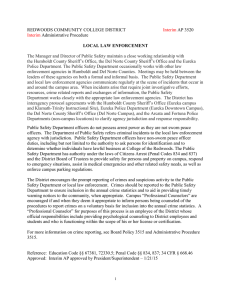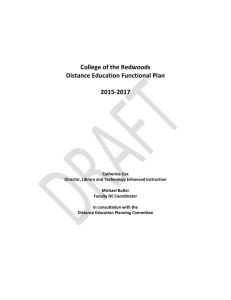Executive Advisory Committee Meeting AB86 Minutes and Actions of the Committee
advertisement

Executive Advisory Committee Meeting AB86 Minutes and Actions of the Committee June 13-23, 2014 F2F Attendees: Julia Peterson, Ed Wilkinson, Bill Damiano, Skip Everheart TEL Attendees: Coleen Parker, Dave Lonn 1. Explanation of the data collection and reporting process (Julia) Stipends available for data collection: Depends on size of area and participation o Meeting attendance o Reporting requirements o Tiered Stipends: $3500.00 Advisory Committee Members $2000.00 Workgroup Participants $1000.00 Smaller Entities o Mileage: Flat fee determined by Federal rate o Lunch will be provided at Workgroup Meetings o Other hotel and travel expenses to be determined o Draft MOU Templates for Information Request/Data Collection and Reporting o Objectives 1, 2, and 4 for the July 31 Report 1. What’s out there now? (Status quo) 2. What is the need? (Gap) 3. What is the difference between what we have and what we would like to have? (Vision) o Julia will send the revised AB86 spreadsheet templates to Coleen for Del Norte. 2. Discussion of unmet needs (gaps) for jails and offenders (Bill) Linking probationers and parolees back up with adult education upon release Outreach to help offenders discover their education and training options: What is available? What kind of apprenticeships, short term training and certification programs are available? Who do they call? How does the Probation department get this information out to offenders? o Unmet need for education (Jail) o Unmet need for transition (Probation) How do we bridge people into training and transition? (Julia) o The first step is just to inform people about what is available. Probation has resources to get information out to people. The current electronic check-in case management system can be used to send “blasts” of information out to people. We can target and blanket specific groups within the probation population. (Bill) o Probation and parole agents can direct their clients to participate in special registration days or other events. o Education can compete with crime. Importance of filling time and providing direction for offenders. o Bridges: Possibilities include working toward an Associate’s degree, Thinking for a Change, parenting, alcohol abuse, vocational classes, Summer Bridge to college. o Need for shorter, discreet programs with certification to build success. 3. Applying Law Enforcement data to the AB86 templates Elementary and Basic Skills: GED, Reading classes Short-term CTE: Vocational students, culinary, agriculture, custodian classes Programs for apprentices: New, wider definition allows OJT to be considered o Credit toward WEX o Need to revisit older training programs, such as CETA o Need to teach “soft skills,” such as accountability, punctuality o WIB o Youth Council—Dale Maples o Sheriff’s Wood Lot Gap/Challenge: Formalizing existing programs for certification o Sheriff’s Wood Lot o Culinary program through the jail kitchen o Computer skills o Soft skills o Need for ESL in jail Solutions o Need portable classrooms o Telepresence o Downtown Campus o Job Market classes/Computer lab o New County Data Reporting Center Data Gathering o Headcount o Operational costs for instructional programs, by program code number (i.e., staff time, instructor time, pencils and paper) o Number of people participating in instructional programs (unduplicated enrollment) o Funding sources Grants WIA I & II VTEA Perkins General Fees State Categorical Other grants and other funds Need to translate the reporting requirements into English and identify appropriate categories to report real-world data o Need to develop a Master Request for data o The Master Request will be customized for individual Members and Partners Probation department tracks Thinking for a Change (staff time, client headcount, etc.) Currently, tracking and reporting of referrals to WEX program is handled exclusively by DHHS. Reports provided by CCP. CR, ETD, and Eureka Adult Education should have data on jail class numbers. Reporting deadline is July 31, 2014 for Objectives 1, 2, and 4. Regional Focus Groups will provide information on unmet needs and course requests by area. 4. Discussion of Del Norte Regional Needs/Questions? CR is fully funded for Non-Credit through FY 2014-15, with an increase in 2015-2016. AB86 has not clarified how much implementation they will fund in the future. CR ABE and ABS (GED) will have a high school diploma option for adults in the future, plus more than 20 new classes awaiting final approval. In Del Norte, CR will offer Reading 260 for Fall 2014, GED class, and a Summer Bridge program for all college bound students in Spring 2015. The Summer Bridge will be for 6 weeks, 10 AM – 3:30 PM each day, which breaks down as an hour and twenty minutes of English, an hour and twenty minutes of Math, a lunch break, and, in the afternoon, Work Readiness and Career and College Exploration and Planning. Del Norte cannot take on 6 weeks, but would like a final week of the Bridge program the second week in June 2015. Possibility of additional sessions throughout the year. CR can customize the curriculum to meet Del Norte’s needs. Need to match planned outcomes with curriculum for Work Readiness and College Study Skills. Non-Credit is a valuable bridge to college, and all classes are free of tuition and fees. No Adult School currently in Del Norte, but the High School Diploma program has 35-40 students. 5. Appointment of Workgroups (Final Roster for Del Norte Area Workgroups) Workgroup 1: ABE & DSPS CR: Julia Peterson Del Norte Unified School District: Special Education Transition Program: Randy Fugate Rural Human Services (RHS): Christy Hernandez, Rick Willems (CalWorks), Renee Quintana (Supportive Living Services), Randy Bancroft (Workforce Center Employment) Sheriff’s Department: Commander Bill Stevens RCRC: Karen Satern Workgroup 2: ESL CR: Julia Peterson Del Norte Unified School District: Jamie Godla Del Norte Reads: Benita Cabrera North Coast Children’s Services: Athena Csutoras Workgroup 3: CTE & Apprenticeships CR: Julia Peterson, Dean Marla Gleave Del Norte Unified School District: Coleen Parker Yurok Tribe: Jim McQuillen Rural Human Services (RHS): Christy Hernandez, Rick Willems (CalWorks), Renee Quintana (Supportive Living Services), Randy Bancroft (Workforce Center Employment) (Final Roster for Eureka Area Workgroups) Workgroup 1: ABE & DSPS CR: Julia Peterson Eureka City Schools: Rick Jordan Humboldt Literacy Project: Emma Breacin Humboldt Law Enforcement--Sheriff's Department: Ed Wilkinson Northern Humboldt Unified School District: David Lonn RCRA Representative: Open CR Disability Student Program Services: Trish Blair Humboldt County Library: Victor Zazueta Workgroup 2: ESL CR: Julia Peterson Eureka City Schools: Rick Jordan Humboldt Literacy Project: Emma Breacin Humboldt State University: John Lee Humboldt COE: Linnea Mandel Workgroup 3: CTE & Apprenticeships CR: Julia Peterson Humboldt County Health & Human Services: Marti Hufft CA Conservation Corps, Fortuna: Larry Nothies Humboldt Law Enforcement—Probation: Bill Damiano Access Humboldt: Sean McLaughlin Carpenters Local 751: Mariann Hassler Humboldt COE: Jon Sapper, Susi Huschle 6. Committee Actions The Committee approved the minutes from the last meeting. The Committee approved the list of proposed Workgroup members. The Committee approved the purchase of a color printer. The Committee approved the next nine (9) Workgroup meetings (To be scheduled). The Committee has directed that all subsequent meetings be scheduled using MS Outlook. Julia will send the revised AB86 spreadsheets to Coleen for Del Norte. Coleen will send contact information for nominated Del Norte Workgroup participants. 7. Timeline for Workgroups and Regional Focus Groups (TBD) Mid-July deadline for data collection Subsequent meetings will be scheduled based on Workgroup member responses. Del Norte (Coleen Parker) will meet monthly with the Program Manager by teleconference (TBD).





